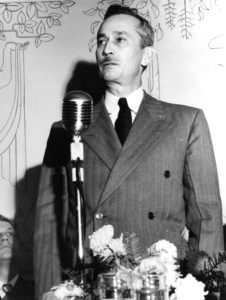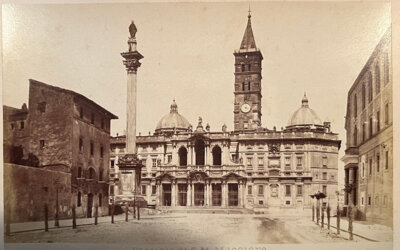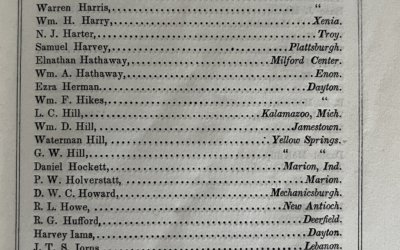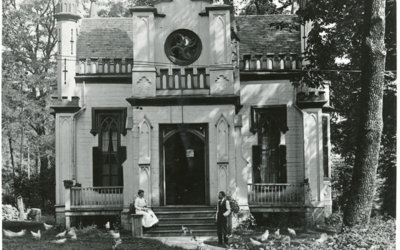The centerpiece of just about every Antioch College Alumni Reunion has been an evening meal usually accompanied by a speech. When  Algo Henderson delivered the following address at the 1935 Alumni Dinner, he was concluding his second year as interim president, filling in for Arthur Morgan who was away building dams for the Tennessee Valley Authority. Here one of the more articulate commentators ever on Antioch College addresses among other subjects, the College as sailing vessel, perhaps a natural metaphor for institutions of higher learning. Most striking in this address is Henderson relating his visit to the cathedral of Chartres to the often elusive concept of ideals, and how one person’s experience informs perception in a most individual and particular way. In this way, he suggests that no two people are likely to agree on what the specific ideals of Antioch College are, although they may have similar interests and goals, because of the powerful influence of experience upon impression. Also that ideals, even when written down and agreed upon, are in a constant state of change. Interestingly, even before the Antioch Civil Liberties Code was conceived, Henderson emphasizes freedom of expression as perhaps the highest of ideals, or at least the vehicle that carries us closer to realizing them. And while he delineates the contributions toward ideals made by faculty, students, and alumni, he concludes that all must work in concert if those ideals are to be strengthened. Some things never change.
Algo Henderson delivered the following address at the 1935 Alumni Dinner, he was concluding his second year as interim president, filling in for Arthur Morgan who was away building dams for the Tennessee Valley Authority. Here one of the more articulate commentators ever on Antioch College addresses among other subjects, the College as sailing vessel, perhaps a natural metaphor for institutions of higher learning. Most striking in this address is Henderson relating his visit to the cathedral of Chartres to the often elusive concept of ideals, and how one person’s experience informs perception in a most individual and particular way. In this way, he suggests that no two people are likely to agree on what the specific ideals of Antioch College are, although they may have similar interests and goals, because of the powerful influence of experience upon impression. Also that ideals, even when written down and agreed upon, are in a constant state of change. Interestingly, even before the Antioch Civil Liberties Code was conceived, Henderson emphasizes freedom of expression as perhaps the highest of ideals, or at least the vehicle that carries us closer to realizing them. And while he delineates the contributions toward ideals made by faculty, students, and alumni, he concludes that all must work in concert if those ideals are to be strengthened. Some things never change.
THE ANTIOCH PORT
AN ADDRESS DELIVERED BY
ACTING PRESIDENT A.D. HENDERSON
AT THE ALUMNI DINNER
JUNE 28, 1935
Yellow Springs, Ohio
It was not without some difficulty that I selected a topic for my talk this evening. The first speech I started to write I submitted to another person for criticism and was told that it was much too undignified for such a solemn occasion. My next effort was abandoned after I had covered six pages with outline and had only two of the three selected points behind me. I feared I might be in the same position in which a speaker on a similar occasion found himself. He announced that he would talk about his Alma Mater, Yale; “Y” stands for youth, “A” for age, “L” for life, and “E” for eternity. To cover these points adequately he talked for two solid hours. When he finally sat down one listener whispered to a fellow sufferer, “It’s a good thing he didn’t graduate from the Massachusetts Institute of Technology.”
It then occurred to me that I might simply tell you about such progress as the college has been making recently. On second thought I realized that if you had been on the campus for as long as two hours before this dinner you would already know more about the progress of the college than I could hope to know.
This past winter I had occasion to read certain comments which a large number of the Antioch faculty members had written about the college. Evidently the faculty are fond of metaphors because several of them had spoken of Antioch as a ship sailing the seas of time. In fact the comparison occurred so many times as to seem to be more than a coincidence and to have possible significance. Now, if Antioch is a ship, it must have a port. Hence the title, “The Antioch Port.”
What is the Antioch Port?
Obviously, in one sense, it is the pause made by the College annually at Commencement time. One group of passengers disembarks and the College prepares for a new contingent. All of the alumni have at some time or other landed at this port.
Of greater significance, however, would seem to be the other port—the ultimate objectives or goal toward which Antiochians are striving—the Antioch ideals. The Antioch ideals, then, constitute the Antioch Port. This statement alone, however, is not sufficient. The ideals need definition before we know the real Antioch Port.
The impression which one receives of any idea depends on the adequacy of the vocabulary of the speaker with which to make an entirely complete statement, and upon the sensitivity to the idea of the one receiving the impression. Last summer while walking through the cathedral of Chartres, I suddenly experienced the interesting sensation of feeling that I had been there before, though I was well aware that I had not. After some puzzled study I realized that I was standing in the exact spot from which an etching which hangs over my desk had been made, The etching is the one upon which I look from time to time when studying the daily problems of Antioch. Thus the cathedral of Chartres has become intertwined with Antioch in my mind.
No words of mine, or of any vocabulary, are sufficient to convey to you fully what I got from that scene. If I described every detail of the cathedral and every etched line of the picture you would not see what I just saw. If you were a student of cathedrals or of etchings, you would get an impression based on your own training. If you have seen the etching or the cathedral you would get still another impression. If you have pondered upon the course of the good ship Antioch you would have a partial basis of understanding. But probably only one who has lived in daily association with this beautiful etching of a most noble subject with his thoughts fixed upon the ideals of Antioch has the sensitivity for the particular impression I received.
The Antioch ideals can no more be expressed with complete adequacy than can a fine etching be described in words. Sensitivity to impression depends upon the background of the individual, his thought, study, previous environment and experiences. The ability to appreciate the Antioch ideals varies with the sensitivity to them. My understanding of them will differ from each of yours.
Though I can make no pretense of stating with full justice the Antioch ideals, I can make certain observations about some of their characteristics. I could do the same for an etching by distinguishing the etched line from the dry-point and the aquatint, and by describing the tone, form and subject matter.
First, these ideals represent a striving for the attainment of the maximum powers of self-expression. This implies the acquisition of knowledge, skills, refinement, methods, and health, overcoming limits of personality, and seeking a more complete adjustment of one’s efforts to his natural abilities.
In the second place, the ideals seek a conservation of human resources to the end that they may be utilized for the most worthwhile purposes. This assumes temperance in living and activities and searching for freedom from waste, disease, vice, social disorders, and war.
Next, the ideals seek a maximum of control over man’s natural environment. This can be effected through promoting scientific research, developing an understanding and appreciation of natural forces, and utilizing such explorations, inventions and devices as tend to free man’s physical energies for better uses.
And finally, the ideals represent a yearning for a higher type of human relations. This implies straightforwardness and candor in dealings, and assumption of good intentions and honest methods, a willingness to see a full measure of justice for others, and working for social reforms which will give the best adjustment of the individual in his relations with the group.
From time to time the statement is made that the Antioch ideals are being compromised and dissipated. Each year several upperclassmen have expressed this opinion to me. From such statements I get one satisfaction—I know that those individuals have become more sensitive to the ideals.
Though I cannot be sure at any moment of the trends affecting the Antioch ideals, I can make certain observations:
- Ideals cannot be merely conserved. They must constantly be the subject of dilution or of strengthening.
- The College faculty are the main reservoir of strength and source of refreshment. They must have adequate opportunity for self-expression. They must also have a willingness to define and redefine those ideals to achieve refinement, just as with great patience, skill, and effort they might sand and polish an antique chest.
- The students must take a large measure of responsibility for the ideals, and be permitted to assume it. The new students each year constitute a great dilution. With the passage of time they become sensitive to the Antioch ideals. The older students have the greatest opportunity to contribute to that growth, because of the closeness of their association.
- The alumni must continue to grow individually and to seek group strength. The first type of Antioch port is not a place to anchor. One must not think of our ship as having only three dimensions. It has more, and can carry those who have disembarked at the first port right along toward the second one. Part of the dilution of the Antioch ideals may come through lack of sufficiently concerted effort by all Antiochians.
- There must from time to time be new inspiration, such as that which may come from this Alumni dinner.
I have just made five observations. They could have been stated in this way:
Ideals are never perfectly expressed but need constant expansion and refinement; the process of definition is the essence of education; education is a life-long occupation; the life we lead is the expression of the real ideals we hold; this expression always lags behind the ultimate ideals, but should be ever approaching them.
To strive constantly for the attainment of these ideals means an ever widening and intensifying of one’s interests and activities, an increasingly richer fuller life. That is the Antioch Port.
“Songs From the Stacks” is a regular selection from Antiochiana: the Antioch College archives by College Archivist Scott Sanders.



